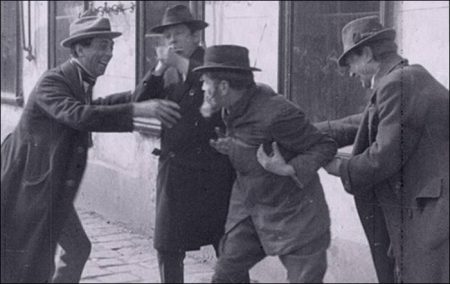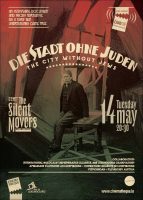The City without Jews movie storyline. In the Republic of Utopia, because of the bad economic crisis ailing the nation, the Jews are made the scapegoats for the economic and social ills affecting the population; therefore, the government decides to expel them. Leo Strakosch is among the exiled. He is engaged to Counsellor’s Linder’s daughter. He gets into the Republic, in a clandestine way, to show to the society the wrongness of their anti-Semitic prejudice. Bettauer’s novel differs essentially from the film version. “Vienna” was named “Utopia”. Even a happy ending was provided.
Die Stadt ohne Juden (The City without Jews) is a 1924 Austrian Expressionist film by Hans Karl Breslauer, based on the book of the same title by Hugo Bettauer. The film is one of the few surviving Expressionist films from Austria and has therefore been well researched. The film was first shown on 25 July 1924 in Vienna.
In his novel, published in 1922, Hugo Bettauer succeeded in creating a relatively accurate allegorical vision of the near future, although the book was intended as entertainment and as a satirical response to the primitive antisemitism of the 1920s. It immediately became Bettauer’s most popular work: it was translated into several languages, and sold over a quarter of a million copies. Shortly after the premiere of the film Hugo Bettauer was murdered by Otto Rothstock, a former member of the Nazi Party, who was lionized by the antisemitic Austrian masses and was released less than two years after having been committed to a psychiatric institution.
About the Story
In Austria the Christian Social Party comes to power, and the new Chancellor Dr. Schwerdtfeger, a fanatical antisemite, sees his people as being ruled by the Jews. He therefore has a law passed by the National Assembly forcing all Jews to emigrate by the end of the year. The law is enthusiastically received by the non-Jewish population, and the Jews leave the country. But after a short time a sober reality makes itself felt.
Cultural life becomes impoverished: in the theatres only plays by Ludwig Ganghofer and Ludwig Anzengruber are still performed. Many cafes are empty, or are converted into beer halls selling sausages. After an initial upturn, the economy declines, as business has greatly diminished, and has moved to other cities, such as Prague and Budapest. Inflation and unemployment run wild.
The political characters of the book (although not of the film, to avoid difficulties with censorship) are delineated in such a way as to be identifiable with real politicians of the period: Bundeskanzler Schwerdtfeger, for example, is based on Ignaz Seipel. Besides the political action, the film also dwells on the love relationship between Lotte (Anny Milety), a typical Viennese girl (Wiener Mädel) and the daughter of a member of the National Assembly who voted for the banishment of the Jews, and the Jewish artist Leo Strakosch (Johannes Riemann).
Towards the end of the film, the National Assembly resolves to bring the Jews back again. However, to achieve the necessary two-thirds majority, Lotte and Leo, who has already illegally returned to Austria with forged papers identifying him as a French painter, have to remove the antisemitic parliamentary representative Bernard (played by Hans Moser), which they do by getting him drunk. The drama reaches a peak as he is committed to a psychiatric institution represented in Expressionist scenery, where in a claustrophobic and asymmetrically painted cell, he sees himself threatened by Stars of David.
This sequence also represents the divergence of the film from the book, as the action of the film is revealed as a dream of the antisemitic Councillor Bernard. This surprising turn of events was described in the original film program as: “In this moment of the highest distress Councillor Bernard awakes from his dream, finds himself in the tavern at a very late hour and says to the baffled Volbert: ‘Thank God that stupid dream is over—we are all just people and we don’t want hate—we want life—we want to live together in peace.'”
The City without Jews (1924)
Directed by: Hans Karl Breslauer
Starring: Johannes Riemann, Eugen Neufeld, Hans Moser, Anny Milety, Ferdinand Mayerhofer, Mizi Griebl, Karl Tema, Hans Effenberger, Gisela Werbisek, Armin Berg, Armin Seydelmann
Screenplay by: H. K. Breslauer, Ida Jenbach
Production Design by: Julius von Borsody
Cinematography by: Hugo Eywo, Eduard von Borsody
Music by: Saunders Kurtz
MPAA Rating: None.
Distributed by: Aywon Film
Release Date: July 25, 1924
Visits: 130

